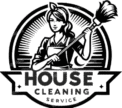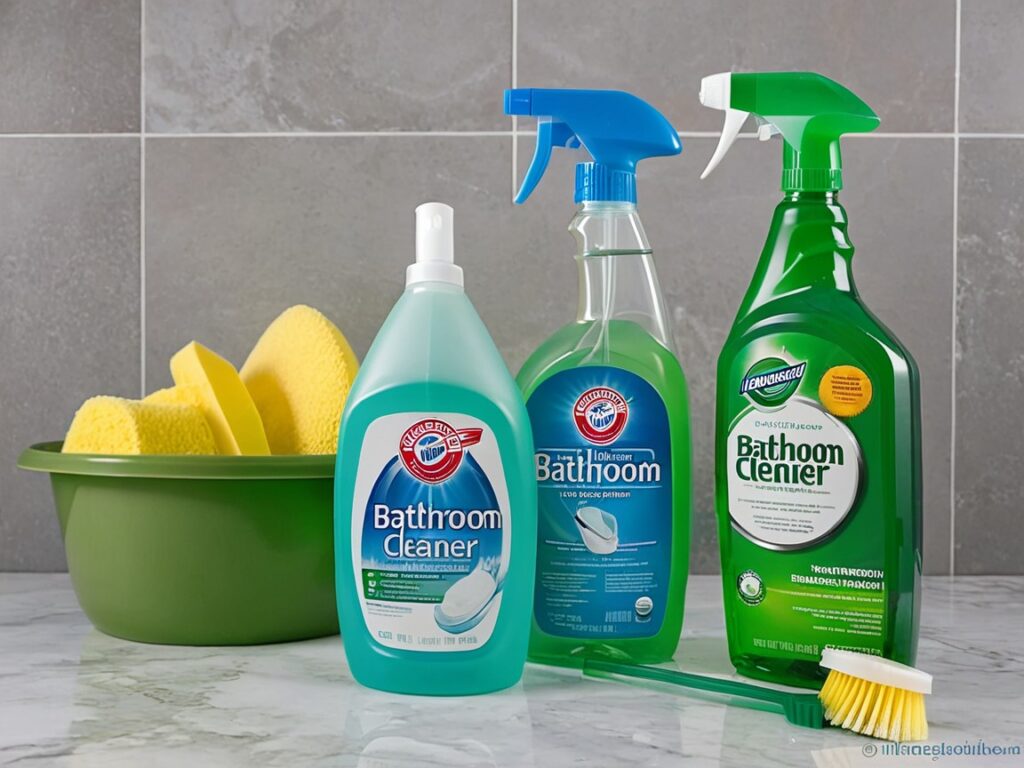
Introduction:
Keeping your bathroom clean doesn’t have to involve harsh chemicals or expensive products. A homemade bathroom cleaner made with simple, natural ingredients can do the job just as effectively—while being safer for your health, your wallet, and the environment. From tackling soap scum to leaving mirrors streak-free, homemade cleaners are an easy and eco-friendly alternative to store-bought options. In this guide, you’ll learn why natural cleaning matters, what ingredients to use, and how to make your own powerful cleaning solutions at home.
Table of Contents
Why Choose a Homemade Bathroom Cleaner
Using a homemade bathroom cleaner is one of the simplest ways to keep your bathroom spotless while protecting your health, budget, and the environment. Many commercial cleaners contain harsh chemicals that can irritate your skin, eyes, and lungs. In contrast, natural ingredients like vinegar, baking soda, and lemon juice are safe, effective, and easy to find in most homes.
One of the main benefits of a homemade bathroom cleaner is safety. You know exactly what goes into your cleaning solution—no hidden toxins or artificial fragrances. This makes it ideal for households with children, pets, or anyone with allergies or sensitivities to strong chemicals.
Another big advantage is cost savings. Store-bought bathroom cleaners can be expensive, especially if you use different products for sinks, tiles, and toilets. With just a few inexpensive ingredients, you can create multiple cleaning solutions that work just as well—if not better—than commercial brands.
A homemade bathroom cleaner is also environmentally friendly. By using reusable spray bottles and biodegradable ingredients, you reduce plastic waste and limit the number of harmful substances washed down your drains. Even small actions can contribute meaningfully to a greener way of life..
Finally, you have the freedom to customize your cleaner. You can adjust the scent with your favorite essential oils or tweak the strength of your mixture for tough stains. This flexibility ensures that your cleaning routine fits your specific needs and preferences.
Switching to a homemade bathroom cleaner is a smart, sustainable choice that combines effectiveness, safety, and savings—all while keeping your bathroom fresh and sparkling.
Essential Ingredients for a Homemade Bathroom Cleaner
Creating an effective homemade bathroom cleaner starts with the right ingredients. These natural and affordable household staples can tackle soap scum, grime, and doors just as well as commercial products—without the harsh chemicals. Here are some of the most powerful ingredients you can use:
1. White Vinegar
White vinegar is one of the most versatile cleaning agents. Its natural acidity helps dissolve soap scum, hard water stains, and mineral buildup. It also kills bacteria and deodorises surfaces, making it perfect for sinks, tiles, and mirrors.
Tip: Avoid using vinegar on natural stone surfaces like marble or granite, as it can cause etching over time.
2. Baking Soda
Baking soda is a gentle abrasive that’s excellent for scrubbing tough stains and removing grime. It also neutralises odours, leaving your bathroom smelling fresh. When combined with vinegar, it creates a natural fizzing reaction that helps lift dirt from surfaces.
Tip: Use it as a paste with water or sprinkle it directly on surfaces before scrubbing.
3. Lemon Juice
Lemon juice is a natural disinfectant and deodoriser. The citric acid helps break down soap scum and water spots, while the fresh scent leaves your bathroom smelling clean and bright.
Tip: Mix lemon juice with vinegar or baking soda for extra cleaning power.
4. Castle Soap
Castile soap is a plant-based, biodegradable soap that’s gentle yet effective. It cuts through grease and grime without leaving harmful residues. It’s great for cleaning counter tops, tubs, and even toilet surfaces.
Tip: Add a few drops to warm water for a mild all-purpose bathroom cleaner.
5. Essential Oils
Essential oils not only add a pleasant fragrance to your homemade bathroom cleaner, but some also have antibacterial and anti fungal properties. Tea tree, lavender, eucalyptus, and lemon oils are popular choices that boost both the scent and cleaning power of your mixture.
Tip: Use 10–15 drops per spray bottle for a balanced, natural aroma.
By combining these simple ingredients, you can create a homemade bathroom cleaner that’s safe, effective, and environmentally friendly. You’ll save money, protect your family from harsh chemicals, and enjoy a naturally clean, fresh-smelling bathroom.
DIY Recipes for Homemade Bathroom Cleaners
Making your own homemade bathroom cleaner is simple, cost-effective, and better for your health and the environment. With just a few common household ingredients, you can create powerful cleaning solutions that tackle everything from soap scum to tough toilet stains. Here are some easy and effective DIY recipes you can try today:
1. All-Purpose Bathroom Cleaner Spray
Perfect for sinks, tiles, and counter tops, this cleaner cuts through grime and disinfects surfaces naturally.
Ingredients:
- 1 cup white vinegar
- 1 cup water
- 1 tablespoon Castle soap
- 10–15 drops of essential oil (tea tree or lemon)
Instructions:
- Combine all ingredients in a spray bottle.
- Shake well before each use.
- Spray on surfaces, let sit for a minute, then wipe clean with a cloth.
Tip: For extra shine on mirrors or faucets, buff with a microfiber cloth afterword.
2. Tile and Grout Cleaner
This mix removes built-up grime and brightens dull tiles without toxic chemicals.
Ingredients:
- ½ cup baking soda
- ¼ cup hydrogen peroxide
- 1 teaspoon liquid dish soap or Castile soap
Instructions:
- Mix ingredients into a smooth paste.
- Apply to tile and grout lines using an old toothbrush.
- Let it sit for 10–15 minutes, then scrub and rinse with warm water.
Tip: Use regularly to prevent mold and mildew buildup.
3. Toilet Bowl Cleaner
Keep your toilet fresh and spotless with this natural foaming cleaner.
Ingredients:
- ½ cup baking soda
- ½ cup white vinegar
- 10 drops of tea tree essential oil
Instructions:
- Sprinkle baking soda into the toilet bowl.
- Add vinegar and let it fizz for 10 minutes.
- Scrub with a toilet brush and flush.
Tip: For extra deodorizing, add a few drops of essential oil after cleaning.
4. Mirror and Glass Cleaner
Get streak-free mirrors and shiny glass surfaces with this quick, chemical-free solution.
Ingredients:
- 1 cup water
- 1 cup white vinegar
- 1 tablespoon rubbing alcohol
- 5 drops of lavender or lemon essential oil (optional)
Instructions:
- Combine all ingredients in a spray bottle.
- Spray lightly on glass or mirrors and wipe with a microfiber cloth.
Tip: Avoid using paper towels—they can leave lint behind.
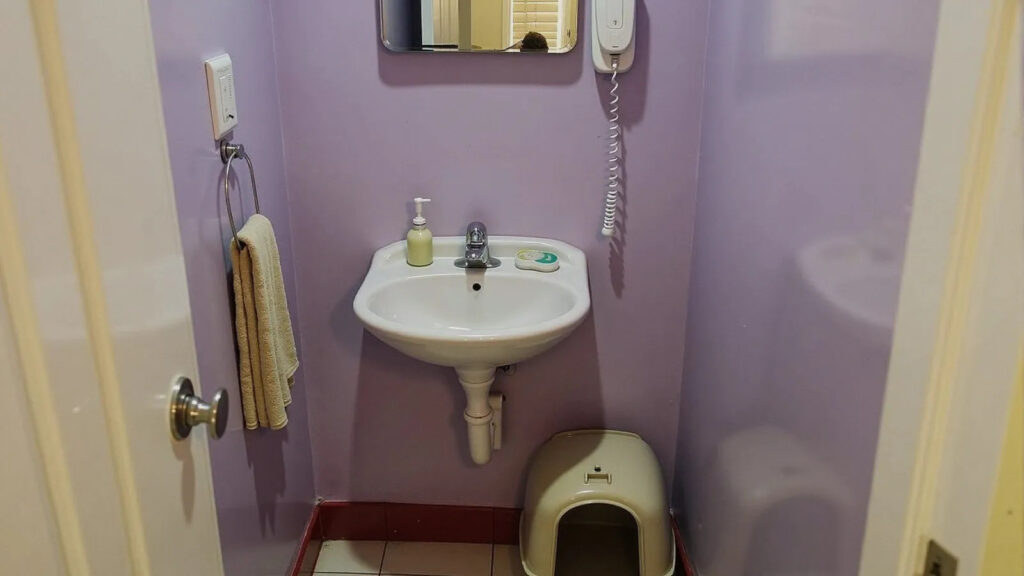
How to Use Homemade Bathroom Cleaners Effectively
Knowing how to use homemade bathroom cleaners effectively ensures you get the best results without wasting time or effort. While these natural solutions are safe and powerful, using them the right way can make a big difference in how clean and fresh your bathroom feels.
1. Start with a Quick Clutter
Before applying any homemade bathroom cleaner, remove items from counters, shelves, and around the sink. This helps you reach all surfaces easily and prevents your personal items from getting sprayed or wet.
2. Spray and Let It Sit
Homemade cleaners need a little time to break down dirt and grime. When cleaning sinks, tiles, or counter tops, spray your cleaner generously and let it sit for 3–5 minutes before wiping. This allows ingredients like vinegar and baking soda to work effectively on buildup and stains.
3. Use the Right Tools
Pair your homemade bathroom cleaner with the right cleaning tools for best results:
- Microfiber cloths for mirrors, glass, and surfaces.
- Old toothbrushes for grout and hard-to-reach areas.
- Soft scrubbing sponges for tubs and sinks.
- Toilet brushes for deep cleaning the bowl.
Using appropriate tools prevents surface damage and helps lift stubborn grime more easily.
4. Rinse Thoroughly
After scrubbing, rinse surfaces with clean water to remove any residue. Even natural ingredients can leave behind a film if not rinsed properly—especially vinegar or baking soda mixtures. Rinsing also helps restore shine to tiles, faucets, and mirrors.
5. Dry Surfaces to Prevent Water Spots
Once you’ve cleaned and rinsed, use a clean microfiber towel to dry surfaces. This prevents water spots, streaks, and mildew growth—especially on tiles and glass.
6. Clean Regularly
Consistency is key. Use your homemade bathroom cleaner once or twice a week to keep dirt and soap scum from building up. Regular maintenance makes deep cleaning much easier and keeps your bathroom smelling fresh.
7. Store Your Cleaners Safely
Keep your DIY cleaners in labelled spray bottles and store them in a cool, dry place away from children and pets. Most mixtures last for 1–2 weeks, but vinegar-based cleaners can stay good for a month if sealed tightly.
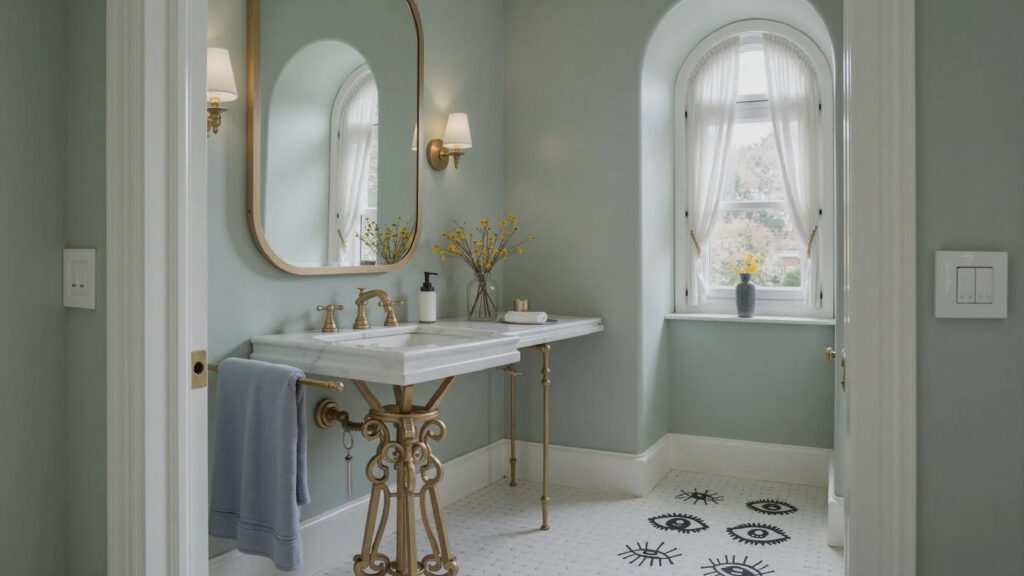
Using a homemade bathroom cleaner the right way helps you achieve a sparkling, hygienic space without the harsh chemicals. With regular use and proper technique, your bathroom will stay clean, fresh, and naturally inviting every day.
Benefits of Using Homemade Bathroom Cleaners
Switching to a homemade bathroom cleaner offers several practical and environmental benefits. These natural solutions are not only safe and effective but also save money and reduce your household’s chemical footprint. Here are the main reasons why using homemade cleaners is a smart choice for every home.
1. Safer for Your Health
Many store-bought bathroom cleaners contain harsh chemicals and artificial fragrances that can irritate your skin, eyes, and lungs. In contrast, a homemade bathroom cleaner made with natural ingredients like vinegar, baking soda, and essential oils is much safer. You know exactly what’s inside your cleaner, so you can protect your family from unnecessary exposure to toxic substances.
2. Environmentally Friendly
Homemade cleaners are eco-friendly because they reduce plastic waste and prevent harmful chemicals from entering the water system. By reusing spray bottles and using biodegradable ingredients, you’re taking an easy step toward a greener, more sustainable lifestyle.
3. Cost-Effective Solution
A homemade bathroom cleaner is incredibly affordable. Most recipes use everyday ingredients already found in your kitchen—such as vinegar, lemon juice, or baking soda. These items cost just a fraction of what commercial cleaners do, saving you money in the long run.
4. Customisation and Versatile
With homemade cleaners, you can adjust recipes based on your needs and preferences. Want a stronger scent? Add a few extra drops of essential oil. Need a more powerful scrub? Increase the baking soda. You can easily create cleaners for tiles, toilets, mirrors, and more—all from the same basic ingredients.
5. Gentle Yet Effective Cleaning
Despite being chemical-free, homemade bathroom cleaners do an excellent job removing soap scum, grime, and stains. Natural ingredients like vinegar disinfect, baking soda scrubs, and lemon juice deodorises—proving that you don’t need harsh chemicals for a sparkling clean bathroom.
6. Pleasant Natural Fragrance
Essential oils like lavender, eucalyptus, and tea tree not only add a fresh scent but also provide antibacterial and anti fungal benefits. Your bathroom smells naturally clean without the overpowering, artificial fragrances found in commercial products.
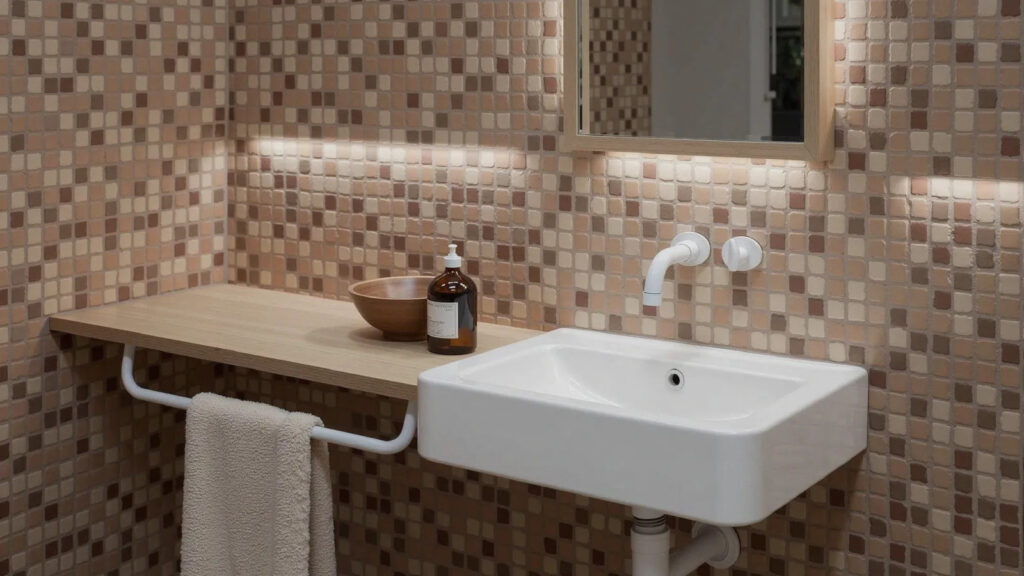
Using a homemade bathroom cleaner is a win-win choice—it’s better for your health, your home, your wallet, and the planet. With minimal effort, you can enjoy a cleaner, fresher bathroom while making an eco-conscious difference.
Common Mistakes to Avoid
Using a homemade bathroom cleaner is an excellent choice for keeping your space clean and eco-friendly. However, even natural cleaners can be used incorrectly if you’re not careful. Avoiding a few common mistakes will help you get the best results and protect your bathroom surfaces.
1. Mixing the Wrong Ingredients
One of the biggest mistakes is combining ingredients that shouldn’t be mixed. For example, never mix vinegar and bleach—it produces toxic fumes. Similarly, vinegar and hydrogen peroxide should not be combined in the same bottle. Always research ingredient combinations before making your homemade bathroom cleaner to ensure they’re safe and effective.
2. Using Vinegar on Delicate Surfaces
While vinegar is a powerful natural cleaner, it’s not suitable for every surface. Avoid using vinegar-based cleaners on natural stone, marble, or granite, as the acid can damage the finish and cause dull spots. For these surfaces, use a mild Castile soap and water mixture instead.
3. Not Letting the Cleaner Sit
Many people spray and immediately wipe the cleaner away. However, homemade bathroom cleaners need a few minutes to break down dirt and grime effectively. Let your cleaner sit for 3–5 minutes before scrubbing or rinsing to achieve better cleaning results.
4. Skipping the Rinse
Even natural ingredients like baking soda or vinegar can leave behind residue if not rinsed properly. After using your cleaner, always rinse surfaces with water and dry with a clean cloth to prevent streaks and residue buildup.
5. Forgetting to Label or Store Properly
When making multiple cleaning solutions, it’s easy to forget what’s inside each bottle. Always label your homemade bathroom cleaners with their ingredients and date of preparation. Store them in a cool, dry place away from sunlight and out of reach of children or pets.
6. Using Too Much Essential Oil
While essential oils add fragrance and antibacterial properties, using too much can leave a greasy film on surfaces or irritate sensitive skin. Stick to 10–15 drops per spray bottle for a pleasant, balanced scent.
By avoiding these simple mistakes, you’ll ensure that your homemade bathroom cleaner remains safe, effective, and long-lasting. A little extra care in preparation and usage can make your natural cleaning routine both powerful and worry-free.
FAQs About Homemade Bathroom Cleaners
If you’re new to using a homemade bathroom cleaner, you might have a few questions about how to make, store, and use them effectively. Below are some of the most frequently asked questions to help you get the best results from your natural cleaning routine.
1. Are homemade bathroom cleaners really effective?
Yes! A homemade bathroom cleaner made with natural ingredients like vinegar, baking soda, and lemon juice can clean just as effectively as many commercial products. These ingredients break down soap scum, remove stains, and disinfect surfaces—all without harsh chemicals.
2. How long can I store a homemade bathroom cleaner?
Most homemade bathroom cleaners last for 1–2 weeks when stored in a sealed spray bottle at room temperature. Vinegar-based cleaners can last longer, up to a month. Always label your bottles with the date and ingredients to keep track.
3. Can I use homemade cleaners on all surfaces?
Not all surfaces are suitable for every natural cleaner. Avoid using vinegar or lemon juice on marble, granite, or other natural stone surfaces, as their acidity can cause damage. For delicate surfaces, use a mild soap and water mixture instead.
4. Are homemade bathroom cleaners safe for pets and children?
Yes, they are generally much safer than chemical-based products. However, keep all cleaning solutions—homemade or store-bought—out of reach of children and pets. Also, avoid spraying directly on surfaces your pets frequently lick or walk on until they’re completely dry.
5. Can I add essential oils to my homemade bathroom cleaner?
Absolutely! Essential oils like tea tree, lavender, lemon, or eucalyptus not only add a pleasant scent but also provide antibacterial and antifungal properties. Just make sure to use them in moderation—about 10–15 drops per 16-ounce spray bottle is ideal.
6. Why does my homemade cleaner leave streaks?
If your cleaner leaves streaks, it’s likely due to too much soap or oil in the mixture. Try adjusting your recipe—reduce Castile soap or essential oils and use a microfiber cloth for wiping mirrors and glass surfaces.
7. How often should I use a homemade bathroom cleaner?
For best results, use your homemade bathroom cleaner once or twice a week. Regular cleaning prevents soap scum, mildew, and stains from building up, keeping your bathroom fresh and easy to maintain.
8. Can I mix vinegar and baking soda together?
Yes—but only for short-term cleaning reactions. When vinegar and baking soda are mixed, they create fizzing that helps lift grime. However, once the fizzing stops, the mixture becomes neutral and loses cleaning power. Use them one after the other, not stored together in the same bottle.
By understanding these basics, you can make the most of your homemade bathroom cleaner—keeping your bathroom sparkling clean, naturally and safely.
Conclusion
Switching to a homemade bathroom cleaner is a simple yet powerful way to maintain a fresh, healthy, and eco-friendly home. With just a few natural ingredients—like vinegar, baking soda, and essential oils—you can create safe and effective cleaning solutions that work just as well as commercial products, without the harsh chemicals.
Not only are homemade bathroom cleaners better for your health and the environment, but they’re also budget-friendly and customizable to your preferences. Whether you want a citrus-scented spray for daily cleaning or a strong scrub for tile grout, you can easily make it yourself in minutes.
By following the tips, recipes, and precautions shared in this guide, you can keep your bathroom sparkling clean while making a positive impact on your family’s well-being and the planet. Start today—mix up your first homemade bathroom cleaner and enjoy a cleaner, greener bathroom the natural way.
